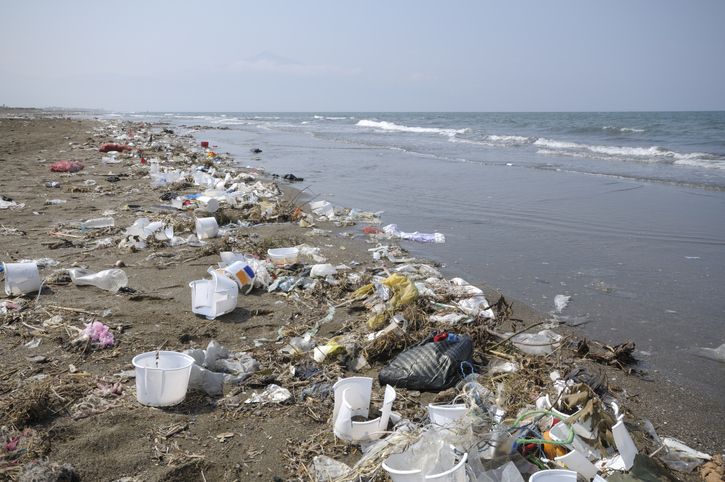A trade union bargaining guide on resource efficiency
Plastic is a useful material that has many positive applications - for example in areas such as healthcare and the preservation and storage of food.
But there are also many downsides to the way that plastics are produced and used. They are often used unnecessarily or in a problematic way.

For example, the excessive use of single-use plastics has created a huge problem of litter and plastic pollution in the environment.
The BBC’s Blue Planet II famously highlighted the devastating impact of plastic on our oceans and marine animals. Globally, less than 10% of plastic waste is recycled.
There are also health concerns about the potential impact of micro-plastic pollution on human health. Micro-plastics are tiny particles of plastic that escape into the air, water and our food and get into our bodies. The long-term effects on health are not yet known, but scientists believe there may be cause for concern.
But it is not just the impact of plastic pollution. The manufacture of new plastic uses fossil fuels. If the consumption of new plastics isn’t reduced, it could hamper efforts to combat climate change. In fact, an increase in the use of new plastics could potentially wipe out most of the benefit in emissions reductions gained from a switch away from fossil fuels for transport.
Human Rights Watch reports that the production, use, and disposal of plastics contribute to the climate crisis and can cause significant harm to the human rights of people around the world. It says that more must be done to address the problem at source as “improving waste removal and recycling will not end the human rights harm of plastic pollution”.
An additional problem is that currently, there isn’t enough capacity to recycle all our waste plastic within Wales. In 2017, around 61% plastic sent for recycling was recycled outside of Wales. Concerns have been raised about the environmental and ethical impacts of plastic waste being shipped overseas.
One of the key ways to address the over consumption of plastics is to retain them in economic use for as long as possible and avoid escape into the environment.
Action on plastics - a checklist:
- Eliminate unnecessary single-use plastics – eg some items could be eliminated altogether or reusable alternatives may be available.
- Prioritise recycled plastics instead of new plastics in procurement.
- Ensure easily recyclable plastics are chosen above harder to recycle ones.
- Caution is needed with some privately run/corporate sponsored collection schemes for hard to recycle plastics and composite materials. These are not always as good as they appear. They can result in items being ‘down-cycled’ – that is, recycled once into items that cannot themselves be recycled. These will ultimately end up in landfill.
- Remember, it’s important to avoid overly demonising one material. In some cases, plastic alternatives may have worse environmental impacts or be unfit for purpose. The sustainability and suitability of alternative materials needs to be fully assessed.
